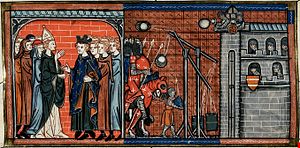Siege of La Rochelle (1224)
| Siege of La Rochelle, 1224 | |||||||||
|---|---|---|---|---|---|---|---|---|---|
| Part of the Capetian-Angevin feuds | |||||||||
 Detail of a medieval miniature of the siege of La Rochelle. |
|||||||||
|
|||||||||
| Belligerents | |||||||||
|
|
|
||||||||
| Commanders and leaders | |||||||||
|
|
|
||||||||
The Siege of La Rochelle of 1224 was the decisive engagement in the campaign between the Capetians and the Plantagenets for control of Poitou. French royal forces commanded by Capetian king Louis VIII laid siege to the strategic port of La Rochelle and its garrison of Poitevin and English soldiers commanded by Savari de Mauléon. The port had long been a staging ground for Plantagenet efforts to regain their continental lands lost to the French crown since 1203. The siege lasted from July to August 1224, and resulted in La Rochelle's citizens surrendering the city to Louis after the failure of English relief to emerge. The siege of La Rochelle was the crowning event of the Capetian conquest of Poitou from the Plantagenets. With Poitou in Capetian hands, only Gascony remained under Plantagenet rule on the continent.
The city of La Rochelle came under Plantagenet rule with the rest of Aquitaine in 1152, when Eleanor of Aquitaine married Henry Plantagenet, the duke of Anjou and Normandy. Two years later, Henry had become king of England as Henry II; his lands, since labelled as the Angevin Empire and comprising much of western France, the kingdom of England and portions of Ireland, were passed on largely intact to his sons Richard I and John. In 1202, 1204 and 1207, John awarded tax privileges to La Rochelle, such as exempting the city from certain taxes, as well as from certain military obligations, and allowing it to tax anybody entering or leaving it.
...
Wikipedia
